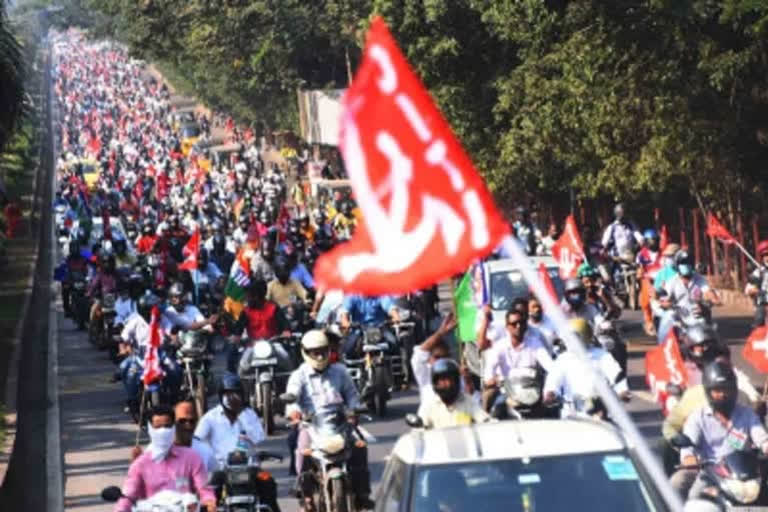New Delhi: The nationwide strike of Trade Unions entered the second day on Tuesday bringing life to a halt in many states. Public transport services came to a standstill in several public sector banks on Monday in states like West Bengal, Kerala and Tamil Nadu on the second day of a two-day nationwide strike by thousands of workers against the policies of the Central government they said are affecting the workers, farmers and common people adversely. The strike called by a dozen Trade Unions, however, did not affect essential services such as healthcare, electricity and fuel supply. Its impact was minimal in educational institutions, including government offices.
Some bank branches, especially in cities with a strong trade union influence, had limited 'over-the-counter' public transactions. The Joint Forum of Central Trade Unions said that the nationwide strike to protest the “wrong policies” of the government has led to a bandh-like situation in at least eight states. According to the joint forum, on the first day, there was a bandh-like situation in Tamil Nadu, Kerala, Puducherry, Andhra Pradesh, Telangana, Odisha, Assam, Haryana and Jharkhand.
According to the forum, protests were staged in many industrial areas in states like Goa, Karnataka, Maharashtra, Chhattisgarh, Punjab, Bihar, Rajasthan, West Bengal, Meghalaya and Arunachal Pradesh. Cash was not immediately available in many ATMs in Maharashtra. Trade Unions claimed that the agitation also had an impact in coal mining areas like Jharkhand, Chhattisgarh and Madhya Pradesh.
The forum is opposing the recent labour reforms and privatisation efforts. Apart from this, there is also a demand for increasing the budget allocation for Mahatma Gandhi Rural Employment Guarantee Act (MNREGA) and regularising the contract workers. Banking services were partially affected due to the support of a section of bank employees to the two-day nationwide general strike by trade unions.
A section of bank employees did not turn up for work on Monday in support of the strike. Employees of public sector banks did not turn up for work due to the strike, affecting transactions. Apart from this, check clearing and other activities were also affected. However, there was no impact on the functioning of the new generation of private sector banks and foreign banks. Apart from opposing privatisation, trade unions are opposing proposed amendments to labour laws and the national monetisation pipeline. The demands include increasing the allocation for MGNREGA (Mahatma Gandhi Rural Employment Guarantee Act) and regularising the contract workers.
The joint forums include INTUC (Indian National Trade Union Congress), AITUC (All India Trade Union Congress), HMS (Hind Mazdoor Sabha), CITU (Centre of Indian Trade Unions), AIUTUC (All India United Trade Union Centre), TUCC (Trade Union Coordination Centre), SEWA (Self Employed Women's Association), AICCTU (All India Central Council of Trade Unions), LPF (Labour Progressive Federation) and UTUC (United Trade Union Congress) besides independent federations from different regions. According to the statement, more than 20 crore employees across the country joined the protest on Monday. The forum claimed that many employees of banks and insurance companies did not go to work.
According to the statement, employees of the electricity department went on strike in states, including Maharashtra, where the government had implemented ESMA (Essential Services Maintenance Act). Services of banks and the insurance sector have also been affected due to the strike. Its partial effect is being seen in the steel and oil sectors.
All India Bank Employees Association (AIBEA) general secretary CH Venkatachalam said the impact of the strike is being felt more in eastern India and all branches of public sector banks are closed. In other areas, despite the presence of officers in the branches of banks, the work is being affected due to the absence of employees. Bank Employees Federation of India (BEFI) and All India Bank Officers Association (AIBOI) are also extending their support to this strike.
Also read: Nation-wide strike impacts banking services at PSU banks



